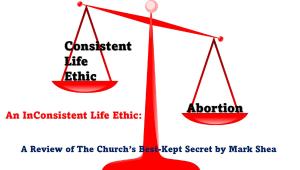A couple of weeks back, a reader challenged me to read Mark Shea’s book, The Church’s Best-Kept Secret: A Primer on Catholic Social Teaching if I wanted “a real discussion about what the Catholic Church teaches about the role of government…” The reader goes on to state about the book, “Either the work stands on its own as an accurate representation of Catholic doctrine or it doesn’t, and dancing around the issue because you may not like him personally will not change that.” For the record, I do not dislike Mark Shea. I also read his blog on occasion. However, I do find his writing on Catholic Social Teaching and politics a bit troubling at times. The way he paints conservatives (and conservative Catholics) on his blog and in the book is inaccurate and uncharitable.
In this article, I offer a review of the book and some of the writing on Mr. Shea’s blog. I show that his approach to Catholic Social Teaching, while not totally factually flawed, does not add anything to what the Church has already stated. Furthermore, his “Consistent Life Ethic” chapter comes off as a desperate attempt to demonize “pro-life” conservatives and approve those who support progressive politicians and policies as more “Catholic.” Such a claim misunderstands and misrepresents Catholic Social Teaching and only servers as an excuse to support extreme progressive politics.
The Good Parts
Subsidiarity is crucial because every human being—made in the image and likeness of the Creator—is made for active participation in his creative work of saving a broken world. Our dignity in living out that reality makes our work a true participation in the work of God by assisting him in the creation and salvation of the world. We are “God’s fellow workers” (1 Corinthians 3:9) because his work of creation and redemption is ongoing till the end of time.
For clarification, with subsidiarity, as defined in Catholic Social Teaching, the role of government takes a backseat to the individual and individual communities. According to the USCCB’s 1986 document, Economic Justice for All: Pastoral Letter on Catholic Social Teaching and the U.S. Economy, government:
should not replace or destroy smaller communities and individual initiative. Rather it should help them to contribute more effectively to social well-being and supplement their activity when the demands of justice exceed their capacities.
And that a good government only intervenes when such an intervention “truly helps” other social groups contribute to the common good by directing, urging, restraining, and regulating economic activity as “the occasion requires and necessity demands.”’
In such a sentiment, I find no issue or fault. Mr. Shea accurately explains that all people, made in the image and likeness of God, is made to participate God’s creation and to the redemption of the world. Furthermore, subsidiarity places the focus of our efforts towards the common good first on the individual, then the community, and finally on government. Again, the government’s role, according to subsidiarity, is to “help.” Therefore, if a government hinders or harms, this goes against Catholic Social Teaching and subsidiarity.
“Consistent Life Ethic”
That is why a Consistent Life Ethic—which is to say the Catholic Life Ethic—defends all human life from conception to natural death without any exception whatsoever. It is not about trying to limit the provision of God to a select population of politically useful human beings. It is about all human beings. It is about the right to live, not merely the right to be born.
And
The Church defends the whole of human life for the whole of life. Above all, the Dignity of the Human Person is about the right to abundant life: the right to reach the full potential of who and what God created each person to be and do. That means, in this life, not merely the right to the bare basics of human existence, but to sufficient food, shelter, health care, work, relations with other human beings, common respect, and love so that we meet our potential to the fullest. In the end, it is about the right of each human being to become the fullness of what God made that person to be: a saint.
Here, Mr. Shea, in an apparently innocuous manner, sets the stage for his attack of “pro-life” conservatives (and Catholic conservatives) and provides the justification of Catholic support for progressive politics. Notice his reference to “politically useful human beings.” Who are these “politically useful human beings?” The unborn. To Mr. Shea, “pro-lifers” use unborn as a political tool to deny born humans their dignity and access to an “abundant life.” All of which are made readily available if one supports progressive political policy (except abortion, of course).
The Unborn as “Human Shields”
Immediately after the overturn of Roe Vs. Wade, Mr. Shea posted an article on his blog titled, What the Cult Actually Will Do. The “cult” referenced in the title are conservatives or MAGA Republicans, or those that do not support progressive politics. As someone who claims to hate abortion, Mr. Shae nowhere celebrates the end of Roe. On the contrary, he seems to lament its passing. He states:
Here’s what you will never see next January: A March for Life Against guns, or for a living wage, or for, heaven forfend, the brown lives most in danger of death, or for universal health care. The prolife movement has been brainwashed for forty years to say, “We have to focus on abortion. Nothing else matters.” What that always really meant was, “We have to focus on battling to maintain these evils while using the unborn as human shields.”
Now that Roe is gone, the cult is going to go on doing what it was designed to do: defend the evils their GOP masters want them to defend. So the energy will now go toward whatever the new policy priority of the GOP is.
Conservatives Support Greater Evil Than Abortion
Moreover, Mr. Shea shares this same sentiment about conservative “evil” in the book. He states:
If your focus is on abortion, fine. Focus on it. But do not pretend to focus on it while actually spending your time and energy fighting against the Magisterium and in favor of capital punishment, fighting against Laudato Si’ and in favor of policies that harm the environment, fighting against a living wage and in favor of laissez faire capitalism (condemned since Rerum Novarum was written in the 1890s), fighting against a century’s worth of magisterial calls for universal health care and denouncing the Church as “socialist” to shout down that call. None of that is “focusing on abortion” and none of it is prudential judgment. It is weaponizing the unborn in order to fight the rest of the Church’s teaching by making the unborn the opposite of and competitor to all the human lives harmed and even killed by sins in these other areas.
And
We may, to be sure, try to lessen evil in an imperfect world without achieving perfection, but we cannot deliberately choose to do evil on the theory that our opposition to some other greater evil (like abortion) gives us a license to indulge an evil we are willing to tolerate.
For Mr. Shea, if a Catholic does not support progressive policies like universal health care, the living wage, and aggressive environmental policies, one does not support the Church. Fine, but if Catholics support progressive policies and progressive politicians that also support unlimited access to abortion, this same Catholic does not support the Church. Mr. Shea leaves his Catholic readers in quite a conundrum.
To Summarize
To summarize Mr. Shea’s views on Consistent Life Ethic and the “pro-life” movement of the past forty years:
- All people, created in the image and likeness of God, must participate in God’s creation and redemption of the world.
- A “Consistent Life Ethic” covers all human life from conception to natural death. This includes supporting progressive political polices, except abortion.
- Since “pro-life” politicians support “evil” conservative policies, greater “evil” occurs in supporting the politicians who only use the unborn as a shield for their “evil” policies.
- Therefore, since supporting conservative “pro-life” politicians is off the table, the only option for Catholics (in the US) are progressive politicians because they support universal healthcare, a living wage, and social safety nets. Sadly, they also support unlimited access to abortion, but this appears to “offset” the guilt by social policies that limit the number of actual abortions.
Again, Mr. Shea leaves his reader with quite a conundrum. Either support “evil” conservative politicians and policies, yet support protecting life in the womb, or support “good” progressive polices and politicians, yet tolerate abortion on demand in the hopes that those “good” polices lead to fewer abortions.
Moreover, what Mr. Shea and other progressive Catholics overlook, in my opinion, is that they have the power to influence progressive politicians, especially Catholic ones, to abandon their support for abortion. Why should Catholics have to choose between “evil” conservative pro-life politicians and “good” progressive pro-abortion politicians?
The USCCB Vs. Pro-Choice Catholic Politicians
Furthermore, this problem was recently exacerbated by these same Catholic pro-abortion politicians in a statement made on June 24th, 2023, that invoked Catholic Social Teaching to support abortion. In the statement, they misinterpret both the Catechism of the Catholic Church and St. Pope John Paul II. They state:
As Catholics, we believe all individuals are free to make their own personal decisions about their bodies, families, and futures. The role of informed conscience is at the very core of our faith. The Catechism of the Catholic Church plainly states that “A human being must always obey the certain judgment of his [or her] conscience. If he [or she] were deliberately to act against it, he [or she] would condemn himself [or herself].” We regard conscience as both a sacred gift and a responsibility: we are called to follow our conscience.
And
Ultimately, as Catholic Democrats who embrace the vocation and mission of the laity as expressed by the late Pope John Paul II in his Apostolic Exhortation, Christifideles Laici, we believe that the Church is the “people of God,” called to be a moral force in the broadest sense. We believe the Church as a community is called to be in the vanguard of creating a more just America and world.
The fundamental tenets of our Catholic faith — social justice, conscience, and religious freedom — compel us to defend a woman’s right to access abortion. We are committed to advocating for the respect and protection of those making the decision if and when to have children.
This, in turn, received a rebuke from the USCCB on June 28th, 2023. The rebuke corrects the errant Catholic politicians thusly:
Nevertheless, conscience is not a license to commit evil and take innocent lives. Conscience cannot and does not justify the act or support of abortion. In fact, conscience ‘must be informed and moral judgment enlightened’ with the Word of God in faith and prayer, and ‘guided by the authoritative teaching of the Church’ [CCC 1783, 1785]. Moreover, the reality that the preborn are our living sisters and brothers is not only a matter of faith, but is attested to by science and sound reason.
And
We once again implore and pray for Congress to join us in working toward the true common good by prioritizing authentic, uplifting support for the vulnerable and marginalized, including mothers and families in need.
Clearly, when “Catholic” progressive politicians cite the Catechism and St. Pope John Paul II in their support of abortion, the hopes for Mr. Shea’s “Consistent Life Ethic” seems to fly out the window.
Final Thoughts
In conclusion, the goal of Mr. Shea’s book is to convince fellow Catholics to adopt a “Consistent Life Ethic” or vote for progressive politicians. He presents this as the more “Catholic” thing to do in both the book and his blog. His vitriol towards conservative “pro-lifers” (including Catholic ones) as using the unborn as “shields” for evil policies is unfair. As a Catholic conservative, I support the true common good, as the USCCB lays out. Do I agree with all conservative politicians and policies? No. Would I vote for a progressive pro-life politician? Yes. Given the fact that thirty Catholic progressive politicians just made a statement that incurred a rebuke from the USCCB over abortion does not bode well for that possibility.
The answer to the conundrum is obvious: progressive Catholics, like Mark Shea, must pressure progressive politicians, especially Catholic progressive politicians, to abandon their views on abortion. If progressive politicians can count on progressive Catholic votes when they support unlimited access to abortion, there exists no reason to adjust their views on abortion. Imagine millions of progressive Catholics refusing to vote for progressive politicians unless they abandon their extreme views on abortion. Heck, some Catholics would even settle for some abortion access in cases of rape and incest, but I wager this option does not exist, either. The fact that such an approach has not yet occurred to progressive Catholics, like Mr. Shea, makes me wonder…Maybe Catholic progressives tolerate the deaths of the unborn in exchange for progressive policies. I hope not, but what other reason is there?
Thank you!
Read my other writing here.













